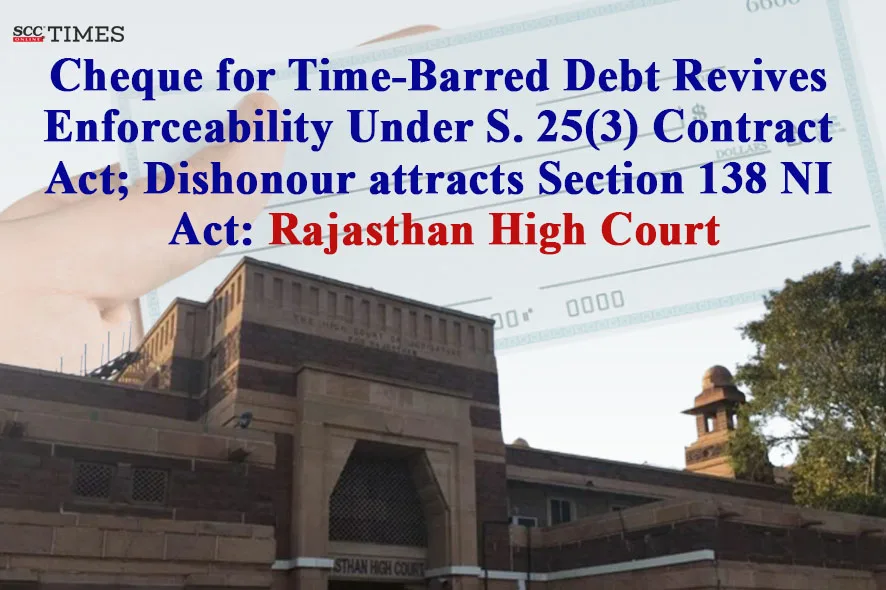Rajasthan High Court: In a batch of criminal revision petitions filed by the petitioner challenging the acquittal of the accused in three cases under Section 138 of the Negotiable Instruments Act, 1881 (‘NI Act’), a Single-Judge Bench of Pramil Kumar Mathur, J., set aside the order of acquittal and dismissed the accused’s petition against his conviction. The Court held that a time-barred debt becomes a legally enforceable debt or liability for the purpose of Section 138 of the NI Act when a cheque is issued towards its repayment. The Court observed that the cheque constitutes a written promise to pay a time-barred debt under Section 25(3) of the Contract Act, 1872.
Background
The petitioner had given money to the accused in 2009. The accused delivered four distinct, signed, but undated cheques, each for Rs. 1,25,000. Subsequently, the petitioner inserted the date in 2013 and presented the cheques for encashment. All four cheques were dishonoured by the bank for the reason of insufficient funds. Despite the service of a legal notice under Section 138 of the N.I. Act, the accused failed to make the payment within the statutory period, compelling the complainant to file four distinct complaints. The Trial Court convicted the accused in all four cases. In appeal, the Appellate Court convicted the accused in only one case with a reduced sentence but acquitted him in the rest of three cases. Against this order, both parties filed revision petitions before the Court.
Analysis and Decision
The Court noted that the law is well settled that once the signature and execution of the cheque is admitted, a statutory presumption arises under Section 118 and 139 of the NI Act that the cheque was issued in discharge of a debt or a liability. This presumption is rebuttable, but the burden lies on the accused to adduce cogent evidence.
A cheque under Section 138 of the NI Act must be issued towards a legally enforceable debt. While a time-barred debt is not enforceable, Section 25(3) of the Contract Act creates an exception. A written promise such as a cheque signed by the debtor constitutes valid consideration for a time-barred debt. Consequently, the liability under Section 138 of the NI Act squarely arises upon the dishonour of a cheque issued towards a time-barred debt. There, the Court rejected the contention of the debt not being legally enforceable.
The Court noted that a meaningful reading of Sections 20, 118 and 139 of the NI Act makes it clear that a person who signs a cheque and delivers it to the payee remains liable unless he successfully rebuts the statutory presumptions. The Court observed that the accused failed to discharge this burden. It is immaterial that the cheque was filled in by any other person if the cheque is duly signed by the drawer, and the cheque is otherwise valid; the penal provisions of Section 138 would be applicable.
The Court noted that the Supreme Court in Bir Singh v. Mukesh Kumar, (2019) 4 SCC 197, had observed that even if a blank cheque is voluntarily signed and handed over by accused towards some payment, it would attract the presumption under Section 139 of the NI Act. In the present case, even if the cheques were issued as security pursuant to a financial transaction, they will not be considered a worthless piece of paper.
Further, the accused had failed to produce any material to substantiate repayment of the 2009 loan. The plea of cheques being a mere security also remains unproved. On the other hand, the execution and delivery of the cheques stand admitted by the accused. In the absence of any rebuttal evidence, the presumption under Section 139 of the NI Act continues to operate.
The Court further observed that,
“The contention that the debt was time-barred by 2012 does not ipso facto exonerate the accused, the very issuance of cheques constitutes a promise within the meaning of Section 25(3) of the Contract Act, 1872 reviving the enforceability of the debt. Accordingly, the requirement of “legally enforceable debt” under Section 138 of the NI Act is satisfied.”
The Appellate court erred in setting aside the conviction by ignoring the legal effect of Section 25(3) of the Contract Act and the presumptions under the NI Act.
In light of the afore-stated discussion, the Court allowed the revision petitions filed by the petitioner against acquittal and dismissed the revision petition filed by the accused against conviction. The judgment of acquittal dated 06-04-2018 passed by the Appellate Court was set aside, and the judgment of conviction and sentence passed by the Trial Court was restored. The accused was convicted under Section 138 of the NI Act in all four cases. The accused was sentenced to undergo six months of simple imprisonment and to pay a fine of Rs. 1,50,000 in each case, with the total fine amount of Rs. 6,00,000/- to be paid as compensation to the petitioner.
[Ratiram Yadav v. Gopal Sharma, 2025 SCC OnLine Raj 5241, decided on 08-10-2025]
Advocates who appeared in this case:
For Petitioner: Mithlesh Kumar, Vivek Choudhary
For Respondent: Vivek Choudhary, Mithlesh Kumar


